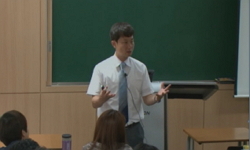목적 본 연구에서는 12주간의 평형성 트레이닝이 태권도 겨루기 선수의 자세조절 기능과 근활성도의 미치는 영향을 확인하는 데 목적을 두었다. 방법 본 연구의 대상은 20대의 남자 태권도 ...
http://chineseinput.net/에서 pinyin(병음)방식으로 중국어를 변환할 수 있습니다.
변환된 중국어를 복사하여 사용하시면 됩니다.
- 中文 을 입력하시려면 zhongwen을 입력하시고 space를누르시면됩니다.
- 北京 을 입력하시려면 beijing을 입력하시고 space를 누르시면 됩니다.

12주간의 평형성 트레이닝이 태권도 선수의 자세조절 기능에 미치는 영향 = Effect of 12 Weeks of Balance Training on Posture Control Function of Taekwondo Players
한글로보기https://www.riss.kr/link?id=A107984376
- 저자
- 발행기관
- 학술지명
- 권호사항
-
발행연도
2021
-
작성언어
-
-
주제어
태권도 ; 평형성 ; 자세조절 ; 근전도 ; 균형성 트레이닝 ; Taekwondo ; equilibrium ; posture adjustment ; electromyography ; balance training
-
등재정보
KCI등재
-
자료형태
학술저널
-
수록면
49-59(11쪽)
-
KCI 피인용횟수
0
- DOI식별코드
- 제공처
-
0
상세조회 -
0
다운로드
부가정보
국문 초록 (Abstract)
방법 본 연구의 대상은 20대의 남자 태권도 선수 30명이었다. 30명의 연구 대상자를 무작위로 15명씩 분할하여 한 집단에게는 12주간의 태권도 트레이닝과 평형성 트레이닝을 적용(실험집단)하고 다른 집단에게는 12주간의 태권도 트레이닝만 적용(대조 집단)하였다. 실험진행 중에 3명이 탈락하여 우리는 최종적으로 실험집단 14명과 대조집단 13명의 데이터를 사용하였다. 모든 연구 대상자들에게는 트레이닝 전ㆍ후에 정적 및 동적 자세조절능력을 측정하였다. 정적 및 동적 자세조절능력을 측정할 때에 발목관절과 무릎관절(4부위)의 주요근육(4부위)의 근전도를 측정하였다.
결과 정적 및 동적 자세조절 능력은 두 집단 모두 유의하게(p<.05) 개선되었다. 정적 및 동적 자세조절 중 근활성도 개선은 평형성 트레이닝에 의해서 주로 좌측 근육들에 집중되었으며, 무릎보다는 발목 근육 위주로 개선되었다.
결론 평형성 트레이닝이 태권도 선수들의 왼쪽 지지발과 그 발목의 근육 활성도를 집중적으로 개선시켜서 자세조절능력을 향상시킬 가능성이 있는 것으로 확인되었다. 따라서 태권도 선수의 자세조절 향상을 위해서는 그 선수의 지지발과 발목 근육을 강화하는 운동이 필요할 것이다.
목적 본 연구에서는 12주간의 평형성 트레이닝이 태권도 겨루기 선수의 자세조절 기능과 근활성도의 미치는 영향을 확인하는 데 목적을 두었다.
방법 본 연구의 대상은 20대의 남자 태권도 선수 30명이었다. 30명의 연구 대상자를 무작위로 15명씩 분할하여 한 집단에게는 12주간의 태권도 트레이닝과 평형성 트레이닝을 적용(실험집단)하고 다른 집단에게는 12주간의 태권도 트레이닝만 적용(대조 집단)하였다. 실험진행 중에 3명이 탈락하여 우리는 최종적으로 실험집단 14명과 대조집단 13명의 데이터를 사용하였다. 모든 연구 대상자들에게는 트레이닝 전ㆍ후에 정적 및 동적 자세조절능력을 측정하였다. 정적 및 동적 자세조절능력을 측정할 때에 발목관절과 무릎관절(4부위)의 주요근육(4부위)의 근전도를 측정하였다.
결과 정적 및 동적 자세조절 능력은 두 집단 모두 유의하게(p<.05) 개선되었다. 정적 및 동적 자세조절 중 근활성도 개선은 평형성 트레이닝에 의해서 주로 좌측 근육들에 집중되었으며, 무릎보다는 발목 근육 위주로 개선되었다.
결론 평형성 트레이닝이 태권도 선수들의 왼쪽 지지발과 그 발목의 근육 활성도를 집중적으로 개선시켜서 자세조절능력을 향상시킬 가능성이 있는 것으로 확인되었다. 따라서 태권도 선수의 자세조절 향상을 위해서는 그 선수의 지지발과 발목 근육을 강화하는 운동이 필요할 것이다.
다국어 초록 (Multilingual Abstract)
Method The subjects of this study were 30 male Taekwondo athletes in their 20s. We randomly divided 30 study subjects into 15 people. We applied 12 weeks of taekwondo training and balance training to one group (experimental group) and only 12 weeks of taekwondo training to the other group (control group).
Results In both groups, static and dynamic postural control abilities significantly improved. The improvement of muscle activity during static and dynamic posture control by balance training was mainly focused on the left muscles and improved primarily on the ankle muscles rather than the knees.
Conclusion We found that balance training can improve posture control ability by intensively improving the left supporting foot and ankle muscle activity of Taekwondo players. Therefore, to improve the posture control of a Taekwondo athlete, exercises to strengthen the athlete's supporting foot and ankle muscles will be required.
Purpose The purpose of this study was to determine the effect of 12 weeks of balance training on posture control function and muscle activity of Taekwondo gyeorugi athletes. Method The subjects of this study were 30 male Taekwondo athletes in their 20...
Purpose The purpose of this study was to determine the effect of 12 weeks of balance training on posture control function and muscle activity of Taekwondo gyeorugi athletes.
Method The subjects of this study were 30 male Taekwondo athletes in their 20s. We randomly divided 30 study subjects into 15 people. We applied 12 weeks of taekwondo training and balance training to one group (experimental group) and only 12 weeks of taekwondo training to the other group (control group).
Results In both groups, static and dynamic postural control abilities significantly improved. The improvement of muscle activity during static and dynamic posture control by balance training was mainly focused on the left muscles and improved primarily on the ankle muscles rather than the knees.
Conclusion We found that balance training can improve posture control ability by intensively improving the left supporting foot and ankle muscle activity of Taekwondo players. Therefore, to improve the posture control of a Taekwondo athlete, exercises to strengthen the athlete's supporting foot and ankle muscles will be required.
참고문헌 (Reference)
1 김영진, "태권도 차기 수련이 지적장애인의 평형성에 미치는 영향" 한국체육과학회 21 (21): 1271-1280, 2012
2 박상갑, "태권도 선수의 신체구성과 체력 및 중심동요에 관한 연구" 한국스포츠리서치 16 (16): 585-592, 2005
3 황시영, "태권도 발차기 동작 시 숙련도에 따른 체간과 하지근육의 근 활성도 비교" 한국체육학회 54 (54): 515-526, 2015
4 김영일, "규칙적인 태권도 운동이 남자 대학생의 뇌파 활성화 및 뇌신경성장인자에 미치는 영향" 한국응용과학기술학회 35 (35): 412-422, 2018
5 Choi, Y. R., "跆拳道 앞돌려차기의 筋電圖的 硏究" Kyunghee University 1986
6 World Taekwondo, "Vision, Mission, Strategy"
7 Fong, S. S. M., "Taekwondo training speeds up the development of balance and sensory functions in young adolescents" 15 (15): 64-68, 2012
8 Pons van Dijk, G., "Taekwondo training improves balance in volunteers over 40" 5 (5): 1-6, 2013
9 Kukkiwon, "Statistics and policy data"
10 William, E. P., "Rehabilitation techniques for sports medicine and athletic training" McGraw-Hill 2011
1 김영진, "태권도 차기 수련이 지적장애인의 평형성에 미치는 영향" 한국체육과학회 21 (21): 1271-1280, 2012
2 박상갑, "태권도 선수의 신체구성과 체력 및 중심동요에 관한 연구" 한국스포츠리서치 16 (16): 585-592, 2005
3 황시영, "태권도 발차기 동작 시 숙련도에 따른 체간과 하지근육의 근 활성도 비교" 한국체육학회 54 (54): 515-526, 2015
4 김영일, "규칙적인 태권도 운동이 남자 대학생의 뇌파 활성화 및 뇌신경성장인자에 미치는 영향" 한국응용과학기술학회 35 (35): 412-422, 2018
5 Choi, Y. R., "跆拳道 앞돌려차기의 筋電圖的 硏究" Kyunghee University 1986
6 World Taekwondo, "Vision, Mission, Strategy"
7 Fong, S. S. M., "Taekwondo training speeds up the development of balance and sensory functions in young adolescents" 15 (15): 64-68, 2012
8 Pons van Dijk, G., "Taekwondo training improves balance in volunteers over 40" 5 (5): 1-6, 2013
9 Kukkiwon, "Statistics and policy data"
10 William, E. P., "Rehabilitation techniques for sports medicine and athletic training" McGraw-Hill 2011
11 Janiszewska, K., "Pre-competition weight loss among Polish taekwondo competitors occurrence, methods and health consequences" 11 : 41-45, 2015
12 Leong, H. T., "Low-level Taekwondo practitioners have better somatosensory organisation in standing balance than sedentary people" 111 : 1787-1793, 2011
13 Korea Taekwondo Association, "Game rules"
14 Guder, F., "Examination of some performance variables that affect balance of taekwondo plyaers" 63 : 41-42, 2017
15 Campos, F. A. D., "Energy demands in taekwondo athletes during combat simulation" 112 : 1221-1228, 2012
16 Bove, M., "Effects of leg muscle tendon vibration on group Ⅰa and group Ⅱ reflex responses to stance perturbation in humans" 15 : 617-630, 2003
17 남상석, "Effects of Taekwondo training on physical fitness factors in Korean elementary students: A systematic review and meta-analysis" 한국운동영양학회 23 (23): 36-47, 2019
18 Yumi Kim, "Effects of Taekwondo intervention on balance in children with autism spectrum disorder" 한국운동재활학회 12 (12): 314-319, 2016
19 Singh, A., "Effect of a 6-week agility training program on performance indices of Indian taekwondo players" 17 (17): 139-143, 2017
20 김현배, "Effect of 8 weeks of pre-season training on body composition, physical fitness, anaerobic capacity, and isokinetic muscle strength in male and female collegiate taekwondo athletes" 한국운동재활학회 11 (11): 101-107, 2015
21 Nardone, A., "Different effect of height on latency of leg and foot short-and medium-latency EMG responses to perturbation of stance in humans" 15 : 89-92, 1996
22 Choi, K. Y., "Comparative analysis of electromyogram on Taekwondo kick motion of the athlets and the non-athletes" Kunkok University 1998
23 Ball, N., "Anthropometrical, physiological, and tracked power profiles of elite taekwondo athletes 9 weeks before the Olympic competition phase" 25 (25): 2752-2763, 2011
24 Kim, S. H., "Analysis of muscle fatigue and mobilization type in major muscles of experts and non-experts during back-round kicking" Seoul University 2002
25 Zar, A., "A survey of the physical fitness of the male taekwondo athletes of the Iranian national team. Facta Universitatis-Series" 6 (6): 21-29, 2008
26 Kazemi, M., "A profile of olympic taekwondo competitors" 5 : 114-121, 2006
27 김현배, "A follow-up study on the physique, body composition, physical fitness, and isokinetic strength of female collegiate Taekwondo athletes" 한국운동재활학회 11 (11): 57-64, 2015
28 양일구, "16주간의 태권도 프로그램이 비만 초등학생의 자세조절에 미치는 영향" 한국웰니스학회 14 (14): 335-344, 2019
29 장명재, "12주간의 탄성 저항운동 트레이닝이 태권도 선수의 등속성 근력과 자세조절 기능에 미치는 영향" 한국체육학회 46 (46): 399-408, 2007
30 신중달, "12주간 태권도 트레이닝이 고령 여성의 정적균형 제어능력에 미치는 영향" 한국체육학회 47 (47): 385-395, 2008
동일학술지(권/호) 다른 논문
-
- 국기원
- 박성언 ( Park Sung-un )
- 2021
- KCI등재
-
스포츠교육모형을 이용한 중ㆍ고등부 태권도 품새 수업이 정의적 영역에 미치는 영향
- 국기원
- 박재윤 ( Park Jae-yoon )
- 2021
- KCI등재
-
- 국기원
- 최동성 ( Choi Dong-sung )
- 2021
- KCI등재
-
Self-talk를 적용한 인지재구성 프로그램이 태권도 선수의 긍정정서, 자기효능감 및 스포츠 수행전략에 미치는 효과
- 국기원
- 김은지 ( Kim Eun-ji )
- 2021
- KCI등재
분석정보
인용정보 인용지수 설명보기
학술지 이력
| 연월일 | 이력구분 | 이력상세 | 등재구분 |
|---|---|---|---|
| 2026 | 평가예정 | 재인증평가 신청대상 (재인증) | |
| 2020-01-01 | 평가 | 등재학술지 유지 (재인증) |  |
| 2017-01-01 | 평가 | 등재학술지 선정 (계속평가) |  |
| 2015-01-01 | 평가 | 등재후보학술지 선정 (신규평가) |  |
학술지 인용정보
| 기준연도 | WOS-KCI 통합IF(2년) | KCIF(2년) | KCIF(3년) |
|---|---|---|---|
| 2016 | 1.19 | 1.19 | 1.25 |
| KCIF(4년) | KCIF(5년) | 중심성지수(3년) | 즉시성지수 |
| 1.23 | 1.22 | 0.917 | 0.13 |





 KCI
KCI KISS
KISS






